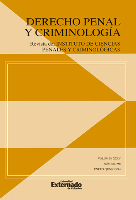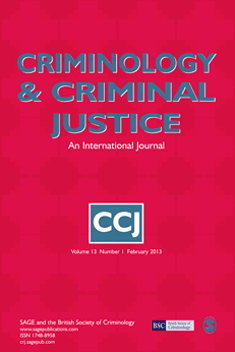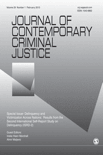
Derecho Penal y Criminologia
Scope & Guideline
Cultivating Critical Analyses for a Just Society
Introduction
Aims and Scopes
- Criminal Law Reform and Policy Analysis:
The journal frequently addresses issues related to the reform of criminal laws and policies, exploring how legislative changes impact justice systems and societal outcomes. - Criminological Theories and Practices:
It delves into various criminological frameworks and theories, analyzing their applicability and relevance in understanding crime and criminal behavior in different contexts. - Social Justice and Human Rights in Criminal Law:
A core focus is the interplay between criminal law and social justice, particularly regarding marginalized groups, and the ethical implications of punitive measures. - Comparative Criminal Law:
The journal often includes comparative analyses of criminal law across different jurisdictions, highlighting variations in legal systems and their implications for justice. - Emerging Criminal Trends and Offenses:
Research on new forms of criminalization, such as cybercrime, femicide, and other contemporary issues, is a significant area of focus, reflecting the evolving nature of crime.
Trending and Emerging
- Intersectionality in Criminal Justice:
There is an increasing focus on intersectional approaches that consider how various identities (gender, class, ethnicity) affect experiences within the criminal justice system, contributing to a more nuanced understanding of justice. - Victimology and Restorative Justice:
Emerging discussions on victimology, particularly regarding the rights and roles of victims in the criminal justice process, alongside restorative justice practices, are becoming more prominent. - Innovative Legal Responses to Gender-Based Violence:
A significant trend is the critical analysis of legal frameworks surrounding gender-based violence, including femicide and sexual crimes, reflecting a broader societal push for gender equality and justice. - Crimmigration and Migration Law:
The intersection of immigration and criminal law, particularly the implications of crimmigration policies, is increasingly relevant as global migration issues continue to rise. - Technological Impacts on Crime and Law Enforcement:
The impact of technology on crime, such as cybercrime and privacy concerns, as well as its role in law enforcement practices, is gaining attention, highlighting the need for legal adaptations to technological advancements.
Declining or Waning
- Traditional Theories of Punishment:
There has been a noticeable decrease in papers focusing on classical theories of punishment, such as deterrence and retribution, as the journal shifts towards examining more progressive and rehabilitative approaches. - General Criminal Procedure:
Discussions centered on general procedures within criminal law have waned, possibly indicating a move towards more specialized topics that address specific legal challenges or innovations. - Historical Perspectives on Criminal Law:
Research exploring historical contexts and developments in criminal law appears to be less prevalent, as the journal emphasizes current and emerging issues over historical analysis. - Focus on Minor Offenses:
There is a diminishing emphasis on minor offenses and misdemeanors, with a trend towards addressing more severe crimes and systemic issues within criminal justice.
Similar Journals

Revista Criminalidad
Bridging Research and Public SafetyRevista Criminalidad, published by POLICIA NAC COLOMBIA, is a distinguished academic journal that has been open access since 1958, making critical research in the field of criminology readily available to the global scholarly community. Based in Colombia, this journal serves as a prominent platform for the dissemination of high-quality research on crime, law, and social sciences. Notably categorized in various quartiles for 2023, including Q2 in Arts and Humanities (miscellaneous) and Q3 in Law, it holds respectable rankings in the Scopus database, reflecting its significance and contribution to both academic and practical discourse. The journal invites researchers, professionals, and students to explore its comprehensive scope, spanning vital themes relevant to criminology and public safety, making it an essential resource for those invested in the interplay between society, law, and criminal behavior. For up-to-date research and insights, the journal is accessible at the CENTRO INVESTIGACIONES CRIMINOLOGICAS DIJIN, AVE EL DORADO 75-25, BOGOTA.

Criminology & Criminal Justice
Elevating Discourse in Criminology and Legal StudiesCriminology & Criminal Justice is a leading academic journal published by SAGE Publications Ltd that serves as an essential resource for scholars, practitioners, and students in the field of criminology and legal studies. With its ISSN 1748-8958 and E-ISSN 1748-8966, this journal has established itself as a crucial platform for innovative research, analysis, and discourse, consistently maintaining a prestigious Q1 ranking in Law. Spanning a diverse range of topics within criminology and criminal justice, it promotes interdisciplinary perspectives that reflect current trends and challenges within the domain. With a notable 93rd percentile ranking in Scopus, the journal ensures that its publications meet rigorous academic standards, fostering the advancement of knowledge and practice in the field. Based in the United Kingdom and catering to a global audience, this journal enhances scholarly communication and collaboration, making it an indispensable tool for those dedicated to unraveling the complexities of crime and justice.

Criminal Law Forum
Navigating the evolving landscape of criminal justice.Criminal Law Forum, published by Springer, is a distinguished journal that serves as a critical platform for scholarly discourse in the field of criminal law. With an ISSN of 1046-8374 and E-ISSN 1572-9850, this journal has been contributing to the legal community since its inception, with a publication span that includes significant periods such as 1989 to 1997, and from 1999 to 2024. Positioned in the Q3 quartile of the Law category and ranked 491 out of 1025 in the Scopus database, Criminal Law Forum showcases innovative research, theoretical insights, and empirical studies that assist professionals, researchers, and students in dissection and comprehension of contemporary legal issues. Though it does not operate on an open-access model, the journal is accessible to subscribers and academic institutions, furthering its reach within the legal academia. By fostering a robust exchange of ideas and encouraging interdisciplinary approaches, Criminal Law Forum continues to enhance the understanding of criminal law, making it an essential resource for those engaged in legal scholarship.

IOWA LAW REVIEW
Pioneering insights into the evolving landscape of law.IOWA LAW REVIEW is a prestigious legal journal published by the University of Iowa College of Law, dedicated to advancing the discourse in the field of law. Since its inception, this journal has become a vital resource for legal scholars, practitioners, and students, committed to publishing rigorous and thought-provoking articles that address contemporary legal challenges. With a strong emphasis on contributions from a diverse range of legal fields, including constitutional law, criminal justice, and property law, the IOWA LAW REVIEW maintains a Q1 ranking in law, reflecting its significance and influence on legal scholarship globally. While the journal is not currently open access, it provides critical insights and perspectives that are essential for understanding the evolving landscape of law. Additionally, with its ranking of #314 out of 1025 in the Scopus database, the journal demonstrates a high impact within the legal community. Scholars and practitioners alike are encouraged to engage with its scholarly articles, as they not only highlight key legal issues but also propose innovative solutions to complex societal problems.

LEGAL AND CRIMINOLOGICAL PSYCHOLOGY
Shaping the Future of Criminological Understanding.LEGAL AND CRIMINOLOGICAL PSYCHOLOGY, published by WILEY, serves as a cornerstone in the interdisciplinary fields of criminal justice and psychological research. With an ISSN of 1355-3259 and an E-ISSN of 2044-8333, this journal has maintained a strong presence in academic discourse since its inception in 1996 and continues to publish vital research through 2024. Renowned for its rigorous approach, it ranks in the Q1 category for Pathology and Forensic Medicine and Q2 in Applied Psychology as of 2023, illustrating its pivotal role in advancing knowledge within these crucial areas. Researchers and practitioners benefit from the latest insights into the psychological facets of legal processes, with a Scopus rank that positions it among the top journals in both applied psychology (Rank #112/249) and pathology (Rank #71/208). The journal acts as an indispensable resource for those interested in the integration of psychological principles within legal frameworks, making it essential reading for academics, professionals, and students aiming to deepen their understanding of criminological psychology.

International E-Journal of Criminal Sciences
Unveiling Insights into Crime and Justice SystemsWelcome to the International E-Journal of Criminal Sciences, a distinguished platform dedicated to the rigorous exploration of contemporary issues within the field of criminal sciences. Published by the DMS INT RESEARCH CENTRE, this journal aims to disseminate high-quality research and critical analyses that foster a deeper understanding of criminal behavior, law enforcement strategies, justice systems, and related societal impacts. With its commitment to open access, it ensures that knowledge is readily available to a global audience, promoting inclusivity and academic collaboration across borders. Although specific metrics like impact factor and H-index have yet to be established, its relevance and contribution to the discourse on criminal sciences remain significant. Researchers, professionals, and students are invited to engage with the journal’s valuable insights, as it strives to become a leading resource for innovative thought and evidence-based solutions in the evolving landscape of criminal science.

Journal of Criminal Law
Innovating Legal Insights Since 1937Welcome to the Journal of Criminal Law, a prestigious publication in the field of legal studies, expertly published by SAGE Publications Ltd. With a rich history that dates back to 1937, this journal has been a vital platform for disseminating innovative research and critical analyses pertaining to criminal law and justice issues. The journal boasts a commendable Q2 ranking in the Law category for 2023, placing it among the top tier of legal publications. It is recognized for its impactful contributions, as indicated by its impressive Scopus Rank of #346 out of 1025 in the Social Sciences - Law category, positioning it within the 66th percentile. Although it does not currently offer open access options, researchers, professionals, and students will find a wealth of rigorously peer-reviewed articles that address contemporary challenges and developments in criminal law. Based in the United States, the journal is committed to fostering scholarly dialogue and advancing understanding in an ever-evolving legal landscape.

Journal of Contemporary Criminal Justice
Transforming Understanding of Justice in Today's World.Journal of Contemporary Criminal Justice is a leading academic publication within the field of criminal justice, published by SAGE Publications Inc. This esteemed journal, bearing the ISSN 1043-9862 and E-ISSN 1552-5406, has been contributing significantly to the discourse on contemporary issues in justice systems since its inception in 1978. Renowned for its rigorous peer-reviewed articles, the journal holds an impressive 2023 ranking within the Q1 quartile in Law, further affirmed by its Scopus rank of #110 out of 1025 in the field of Social Sciences - Law, placing it in the 89th percentile. Though not an open access journal, it provides a vital platform for scholars, practitioners, and students seeking to explore and disseminate pioneering research and practical insights into the evolving criminal justice landscape. The journal covers a wide array of topics, from policy analysis to sociological perspectives, ensuring its relevance across multiple disciplines. With a commitment to advancing the understanding of justice in contemporary society, the Journal of Contemporary Criminal Justice is an essential resource for anyone engaged in the fields of criminology, criminal law, and social policy.

Journal of Penal Law and Criminology-Ceza Hukuku ve Kriminoloji Dergisi
Fostering Dialogue in Law and CriminologyThe Journal of Penal Law and Criminology-Ceza Hukuku ve Kriminoloji Dergisi, published by ISTANBUL UNIV, is a prestigious platform dedicated to the advancement of knowledge in the fields of criminal law and criminology. With its Open Access policy adopted since 2017, it aims to promote the dissemination of research findings and theoretical discussions, ensuring that vital insights in criminal justice, legal reforms, and criminological studies are accessible to a global audience. This journal serves as a vital resource for academics, legal practitioners, and students alike, fostering interdisciplinary dialogue and encouraging innovative research. By focusing on contemporary issues in penal law and criminology, the journal enhances understanding and addresses the complexities of justice in a rapidly changing society. With an ISSN of 2148-6646 and an E-ISSN of 2602-3911, it continuously strives to maintain high scholarly standards and relevance in its contributions to the field.

Vox Juris
Unleashing the potential of legal research and scholarship.Vox Juris is a premier academic journal dedicated to the field of legal studies, published by the esteemed Universidad San Martin de Porres, Fondo Editorial. Since its transition to Open Access in 2015, it has significantly enhanced the dissemination of high-quality legal research and scholarship, providing unrestricted access to a wide audience of researchers, professionals, and students globally. Although the journal's H-index and specific scope are currently unspecified, it actively contributes to the discourse surrounding various facets of law, including theory, applications, and interdisciplinary perspectives. Located in the heart of Peru at SEDE LIMA JR LAS CALANDRIAS N0 151291 SANTA ANITA, Vox Juris serves as a vital resource for those seeking to explore and advance their understanding of contemporary legal issues. Its commitment to promoting scholarly dialogue makes it an indispensable platform for both emerging and established voices in the legal community.